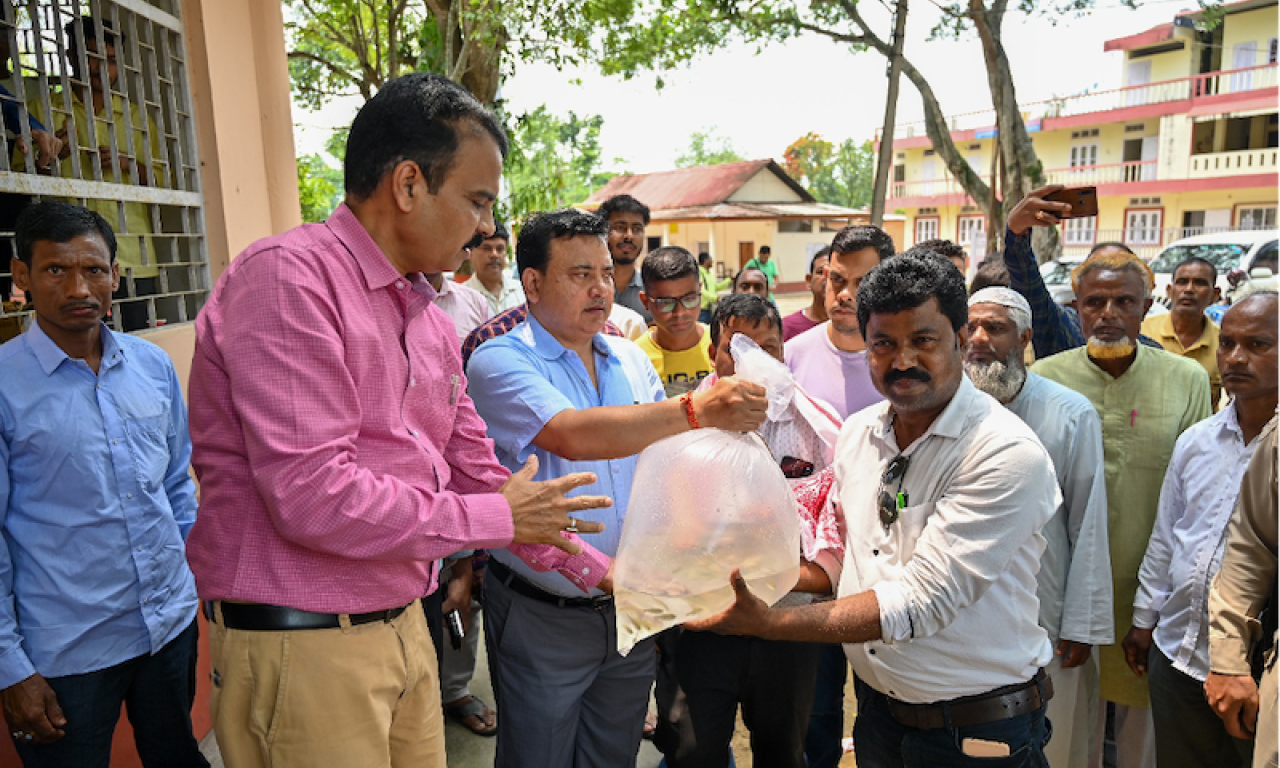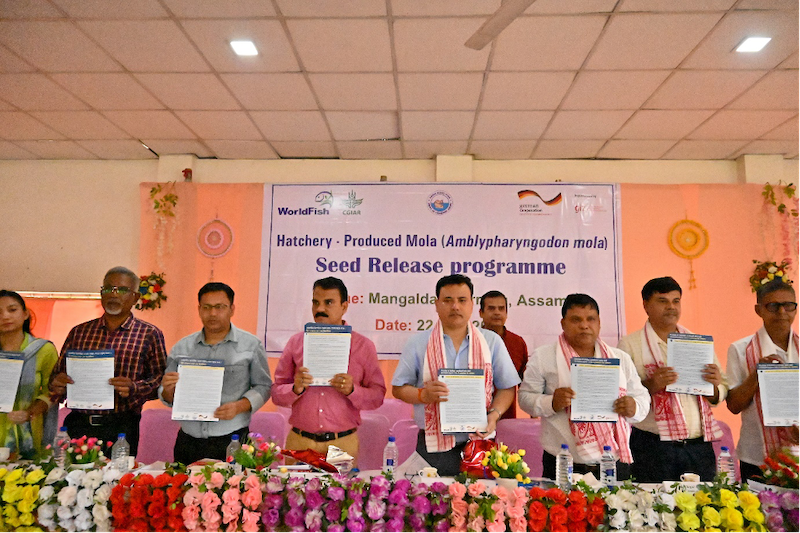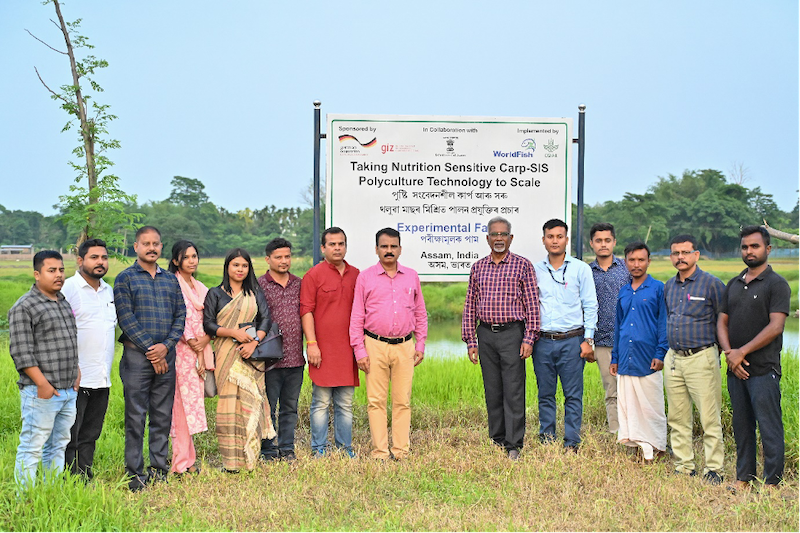
- WorldFish successfully developed a simple and replicable technique for mass-producing mola seeds, which has enormous promise for promoting nutrition-sensitive aquaculture in South Asia.
- Building on the experience in Odisha, the project team has achieved a key milestone in Assam by implementing induced breeding and produced nearly 1 million mola seeds – a first in Northeast India.
- The hatchery-produced mola seed release program held in collaboration with the Assam Department of Fisheries is a testament to the endorsement and active engagement of local farmers, as well as demonstrating the promising prospects of mola culture for income generation and nutrition in Assam.
Mola, an indigenous small fish species (SIS) rich in vital micronutrients, is crucial in promoting nutrition-sensitive aquaculture in South Asia and can significantly help in reducing malnutrition through food-based strategies. However, the lack of standardized techniques for large-scale hatchery production of this micronutrient-dense SIS presents a major technical barrier to advancing nutrition-sensitive aquaculture approaches.
In 2022, WorldFish successfully developed a simple and easily replicable technique for mass production of mola seeds in an Odisha hatchery through the Taking Nutrition-Sensitive Carp-SIS Polyculture Technology to Scale project funded by Deutsche Gesellschaft für Internationale Zusammenarbeit (GIZ). This groundbreaking accomplishment has enormous potential to accelerate the growth of nutrition-sensitive aquaculture across the subcontinent.
The project team recently reached a significant milestone by successfully implementing induced breeding in the state of Assam, drawing on the experiences and knowledge gained in Odisha. This is a pioneering achievement for Northeast India. From March to May 2023, the project team demonstrated its capabilities by producing roughly 1 million mola seeds. This feat was accomplished in collaboration with Biswajyoti Sarma’s hatchery, located in Chotonagoan village of the Mangaldai block, within the Darrang district of Assam. Aside from successful breeding, the project team has developed improved management practices for the nurturing of mola seeds in pond environments.
Providing stocking guidelines to ensure success

WorldFish hosted a hatchery-produced mola seed release program in May 2023, in collaboration with the Assam Department of Fisheries in the Darrang district to mark this historic occasion.
Munindra Nath Ngatey, the Darang district deputy commissioner, graced the event, as did Pankaj Kumar Deka, the district development commissioner, Sanjay Sarma, the World Bank-APART project fisheries coordinator and Bipul Khataniar, the district fisheries development officer.
Among the other guests were Sudip Kanta Basistha, Nijira Basumatarry and Shaikhom Inaotombi from GIZ India, Abdul Hafiz from Krishi Vigyan Kendra and Punyasloke Bhadury from the Indian Institute of Science Education and Research (IISER-Kolkata). Approximately 100 farmers, fish producers, seed growers, hatchery operators and Farmers Producers Companies (FPC) members attended the event.
The event demonstrated the huge potential of mola seed production in Assam, as seen by the enthusiastic support and active involvement of the Department of Fisheries, local farmers and FPC members. To mark the occasion, Ngatey handed over oxygen-packed bags of mola seeds to farmers, as well as the stocking guideline for hatchery-produced mola seed.
Bringing prosperity to aquatic food producers in Assam

"Due to its shorter life cycle and rapid growth, mola culture holds a bright future in Assam for income generation through fish farming and nutrition," said Ngatey in highlighting the promising prospects of mola culture.
In recognition of WorldFish's innovative efforts, Sarma expressed his admiration and emphasized that unlocking the technology for hatchery-based mass production of mola seed would accelerate the progress of the nutrition-sensitive carp-mola polyculture technology, which would significantly improve food and nutrition security in villages throughout Assam.
"After recovering from severe floods in 2022, we have achieved a significant milestone by successfully breeding mola at our partner hatchery in Assam,” said Suresh Rajendran, a WorldFish consultant in Assam.
“This achievement is especially impressive given Assam’s climatic fragility and distinctive agroecological zone in comparison to Odisha," added Rajendran.
The hatchery-produced mola seed release program is a testament to the dedication and collaborative efforts of WorldFish, the Department of Fisheries and the local community. Mola culture, with its capacity to increase incomes and improve nutrition, has the potential to improve people’s lives in Assam. WorldFish and partners are paving the way for a brighter future in aquaculture and food security via sustained innovation and sustainable practices.
Acknowledgement
This project is funded by the German Federal Ministry for Economic Cooperation and Development (BMZ) and commissioned by the Deutsche Gesellschaft für Internationale Zusammenarbeit (GIZ) through the Fund International Agricultural Research (FIA).
Funded by



